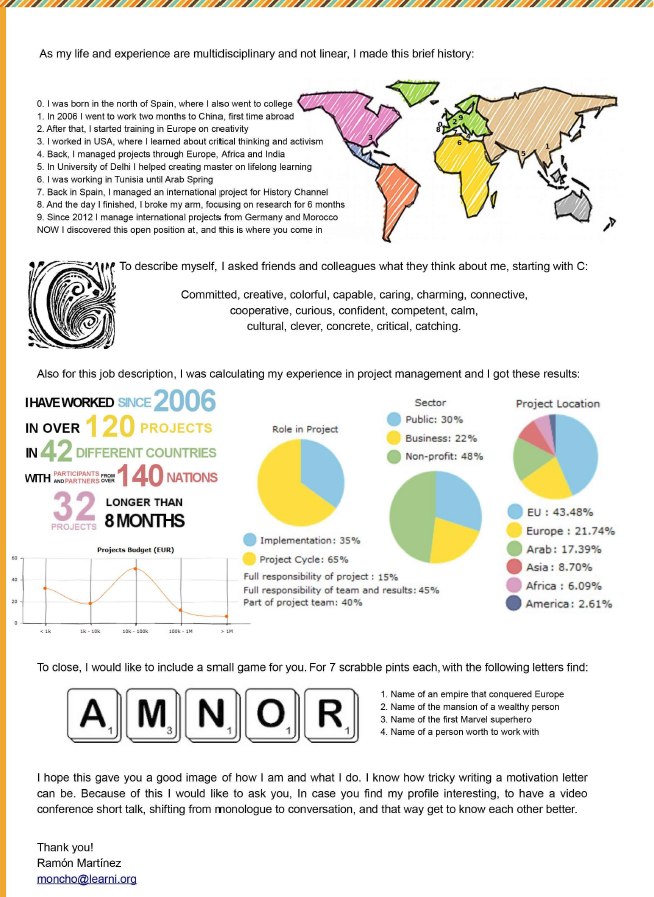Last week, I happened to have a great little meeting with a young university senior who wished to discuss his employment options.
I must admit that I was quite impressed with the young man’s stories and overall character. However, when it came to representing himself via his CV, he fell victim to the same naivety all graduates continue to have.
Apparently, the CV is the presumed first point of contact with an employer

I emphasize the word “presumed”, simply because the CV will continue to be the first point of contact for only those who continue to accept it as such. (Personally, I’ve never used my CV to get a job!)
However, the CV was not always what it is today. Let’s try to put things into perspective here:
The very first CV was introduced in 1482 by Leonardo Da Vinci

Of course, it did not resemble today’s modern resume in any way. His intention was not to compete with other candidates for a position, but quite simply to introduce himself. Of course, since then, the CV has continued to evolve to the form we know today.
There’s actually a very interesting article on Business Insider on the evolution of the CV. There’s no need to repeat. You can read it here.
In agreement with the article, CV’s have gotten to the point where they are either fully or partially digital

Yet, this is still not the norm in most countries. In my experience, unemployed youth continue to use the standard approach of writing a single 1-2 page resume that they feel represents them adequately. They then send it to ALL the employers that interest them. The laziest even use the standard Europass template.
In particular, the Europass CV makes life easier in 2 ways: Firstly, it’s a great starting point for beginners to build a great resume simply because it includes many relative fields. Secondly, employers simply filter out any applicants which lazily choose to use the given Europass template. For many employers that I’ve chatted with, it’s actually laughable.
I recall one employer in particular that opened my eyes to how CV’s are scanned

As a CEO of a web agency, he was looking for a graphic designer and requested that I send him 10 CV’s that I would recommend. After reading through a decent number of CV’s I had in my possession, I sent him some that I felt were most relevant.
Of course, it should be mentioned that I was completely ignorant about the field of graphics and web design at the time. Needless to say, it was all very educational. About a week later he happened to pass by my office and I called him over.
Being a learner, I wanted some feedback about the CVs and was very grateful to hear his honest response: “To be frank, they were not very impressive. Except one.” He followed by pulling the CV out of his bag and handed it to me requesting that I have a look. As I naively scanned the resume, I admit that I found nothing that stood out. I shook my head and handed it back to him unimpressed. He looked at me with a smirk on his face and asked, “You don’t see it?”
He pointed at the font and the template and passionately expressed that such a font or template design does not exist. The candidate did it all from scratch. He exclaimed, “If this kid is passionate enough about design to actually design his CV, then I will happily have him.” The statement hit me like a lightning bolt. He didn’t even reference anything the CV actually stated! Instead, he focused on the one thing that PROVED the candidate could do the job.
The event really got me thinking. If designers can design their CV, then how would this apply to other fields?
Can an architect make a CV in a blueprint form? Can Software Developers program their CV? Is there a way for Business graduates to “sell” their CV? Basically, would it be possible to build your CV accordingly with the industry you are trying to enter in a way to prove relevant skill sets? It didn’t take much research to discover a few pioneers.
The first thing I noticed was that there was 2 ways to go about it

Firstly, many people build their CV in a way to exhibit that they have the skill sets required by the industry. For example, Robby Leonardi, a multidisciplinary designer, programmed his online interactive CV which the viewer can scroll through. If you’ve never seen it, take a look here. Obviously, Robby has gained more experience than any typical graduate. However, the point is that he successfully proves not only his skills, but more importantly his passion.
A quick online search will show you many more examples such as Liugle, the google search themed online CV, designed by Chris Liu who sought a job in advertising. Another successful approach was that of Philippe Dubost who, in order to apply for a Web Product Manager position, decided to design his CV to look like an Amazon product page.
All these are great examples of youngsters who designed their CV in such a manner to prove to employers that they have both knowledge and skills in their respective industry.
On the other side of the coin are the pioneers, who used their CV to exhibit something extra about themselves

This was sometimes in line with Simon Sinek’s “Why Focused CV” where people emphasize their internal drivers. One great example is that of Melissa Washin who basically sewed her CV on fabric.
While she was a designer applying for a design position, she also wanted to exhibit her embroidery skills. You can check out her designs on her website.
The last CV I will be mentioning is that of Ramon Martinez, a young Spanish-born international project manager

Ramon wanted to use his resume to illustrate his creative challenge-oriented personality. Simply put, it’s more than a simple read. Take a look and attempt to solve his riddles.
To conclude, I would not say that ALL young professionals should mimic these pioneers

Quite the contrary, everyone should try to be their own version of original by focusing on one major point. Everyone writes CV’s to promise potential employers that they deserve an opportunity.
The most ideal situation for the employer, however, would be if the candidate can prove what they can do even before the interview.
So, depending on your field, I would challenge you to ask yourself the question: “How can I build my CV in such a way to prove that I deserve the opportunity?”
Take a shot at being different. Fitting in doesn’t work any more. Be your own pioneer!
Author: Tasos Constantinou








